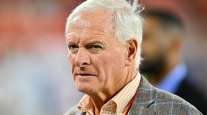Former Pilot Flying J Sales Exec Ordered Up Fraud 'Manual'

CHATTANOOGA, Tenn. – It was getting tough to keep up with the cheating, and getting caught had proven expensive for the nation’s largest diesel fuel retailer. But Pilot Flying J sales executive Arnie Ralenkotter had a solution: A fraud “manual.”
Ralenkotter has confessed carrying out a five-year scheme at the truck stop giant to lure trucking companies to buy diesel fuel at Pilot Flying J in return for discounts and then short them.
He is one of 26 witnesses who have testified since November in the trial of former Pilot Flying J President Mark Hazelwood, former Vice President Scott “Scooter” Wombold and former account representatives Heather Jones and Karen Mann.
Jurors return to U.S. District Court in Chattanooga on Feb. 12 to continue deliberating the quartet’s fate on conspiracy to commit wire and mail fraud charges.
Don’t get caught
Assistant U.S. Attorneys Trey Hamilton and David Lewen used Ralenkotter, other Pilot Flying J sales executives and staffers, secret recordings and emails to build their case that fraud was pervasive within the direct sales division helmed by Hazelwood.
RELATED: Hazelwood attorney says feds are making a crime out of civil fraud
RELATED: Former Pilot Flying J president’s pay doubled to $26.9 million during fraud scheme, records show
They used as an example Ralenkotter’s push for a way to cut down on the risk of getting caught.
By December 2011, testimony has shown, Pilot Flying J had paid more than $1 million to soothe the tempers of trucking firm owners who realized they were being shorted on promised diesel fuel discounts.
Sales executives were, by then, cheating more than 100 trucking firms out of hundreds of thousands of dollars in discounts each year, and that number was growing as was the truck stop giant’s market share and profits, testimony has shown.
Ralenkotter, secret recordings showed, was keenly aware of the risks of getting caught, including prison. It’s why, he said on those recordings, he didn’t cheat the U.S. Postal Service.
Emails and testimony showed there were two key ways cheating Pilot Flying J salesmen could get caught by their victims: salesmen unaware of the promised discount, and paperwork known as “back up,” which detailed the math behind diesel fuel pricing.
The ‘manual’
Ralenkotter wanted to create a system to both identify new potential fraud victims and keep up with the promised rebates and the amounts actually being paid. He asked account representative Lexie Holden to generate a list of potential victims.
“It was a hit list, a target list, a list of customers that were to be focused on,” Holden testified.
Ralenkotter schooled another account representative, Janet Welch, on marking current victims in the system.
In an email, Ralenkotter told Welch to share her method of keeping up with fraud victims with the other sales staffers who did the paperwork on fuel rebates.
“Ask Janet (Welch) about the Janet manual,” Ralenkotter wrote. “We should do the Lexie (Holden) manual, and the Karen (Mann) manual, also.”
Ralenkotter and other sales executives, including former Director Brian Mosher and former Vice President John “Stick” Freeman, often ordered the all-female staff of account representatives to avoid sending “back up” to fraud victims, testimony and emails showed.
Screening salesmen
Initially, the fraudsters within Pilot Flying J were careful about which new salesmen to draw into the scheme, testimony showed.
Kevin Clark had experience working in the trucking industry, and testimony showed there were questions about his loyalties.
“Just a thought — we aren’t discussing any adjustments to rebates because of Kevin’s connection to trucking, right?” Holden wrote Ralenkotter.
Ralenkotter, Mosher and Freeman, testimony showed, would cut rebates for some salesmen’s customers without telling the trucking firms or the salesmen, and that often led to slips of the tongue that would lead to discovery of the fraud.
“I understood Mosher was handling the adjustments … and not telling (a subordinate),” Holden testified. “It was a topic in the office.”
Ralenkotter gave Holden approval to let Clark in on the scheme in December 2011 because Clark was set to meet with Freeman and Hazelwood to go over the profits and losses his sales work had produced. It was a required meeting for salesmen and sales executives. Mosher testified that fraud profits were listed separately as “savings” in the profit-loss reports and that both Hazelwood and Pilot Flying J CEO Jimmy Haslam reviewed the reports.
Clark, as it turned out, already knew about the fraud scheme.
“His remark was, he knew it, (that) adjustments were happening,” Holden said.
Clark testified that he, too, began cheating customers and listed the fraud profits separately on his reports, which he said he reviewed with Hazelwood. He said he couldn’t recall specific times Haslam was in the room for those meetings although he would occasionally “pop in.”
“During (profit and loss) reviews, it would come up, a customer’s getting a good deal, and it would be … that’s not what they’re getting,” Clark testified.
Fourteen former Pilot Flying J executives and staffers, including Clark and Holden, have pleaded guilty to conspiracy charges. Two others were granted immunity. Pilot Flying J’s board of directors has confessed criminal responsibility. The firm has paid $92 million in criminal penalties and $85 million in lawsuit settlements.
Pilot Flying J is picking up the defense tab for Hazelwood and his accused former subordinates. Haslam has denied knowledge of the scheme and is not charged.
Distributed by Tribune Content Agency, LLC



